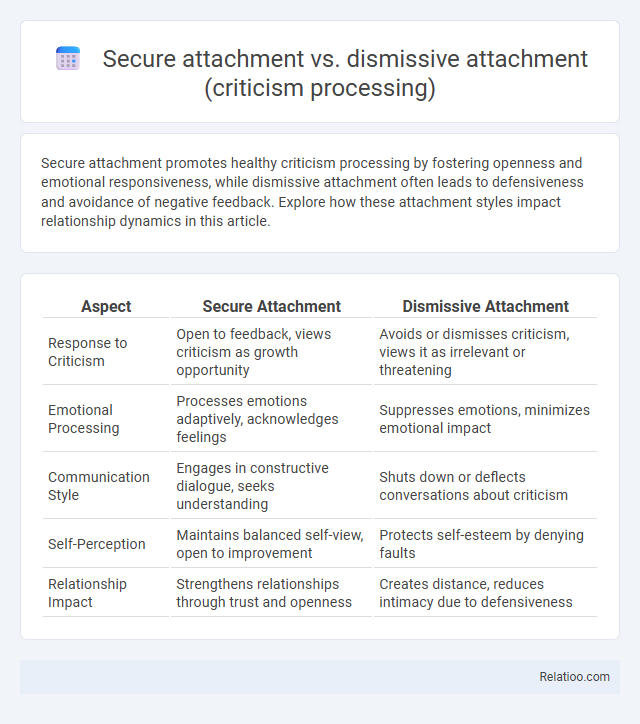Secure attachment promotes healthy criticism processing by fostering openness and emotional responsiveness, while dismissive attachment often leads to defensiveness and avoidance of negative feedback. Explore how these attachment styles impact relationship dynamics in this article.
Table of Comparison
| Aspect | Secure Attachment | Dismissive Attachment |
|---|---|---|
| Response to Criticism | Open to feedback, views criticism as growth opportunity | Avoids or dismisses criticism, views it as irrelevant or threatening |
| Emotional Processing | Processes emotions adaptively, acknowledges feelings | Suppresses emotions, minimizes emotional impact |
| Communication Style | Engages in constructive dialogue, seeks understanding | Shuts down or deflects conversations about criticism |
| Self-Perception | Maintains balanced self-view, open to improvement | Protects self-esteem by denying faults |
| Relationship Impact | Strengthens relationships through trust and openness | Creates distance, reduces intimacy due to defensiveness |
Understanding Attachment Styles: Secure vs Dismissive
Secure attachment fosters open communication and effective processing of criticism, promoting emotional resilience and trust in relationships. Dismissive attachment typically entails minimizing or rejecting criticism to protect self-esteem, which can hinder emotional growth and connection. Understanding these styles highlights how secure individuals confront feedback constructively, while dismissive types avoid vulnerability, impacting relationship dynamics and personal development.
Core Traits of Secure Attachment
Secure attachment is characterized by trust, effective emotion regulation, and openness to feedback, enabling individuals to process criticism constructively and maintain healthy relationships. In contrast, dismissive attachment involves emotional distancing and defensiveness, leading to difficulties in accepting criticism and potential relational conflicts. Core traits of secure attachment include confidence in self-worth, balanced autonomy, and resilience in managing negative feedback without withdrawal or aggression.
Defining Dismissive (Avoidant) Attachment
Dismissive (avoidant) attachment is characterized by an individual's tendency to minimize emotional closeness and reject intimacy, often processing criticism defensively or by distancing themselves. Unlike securely attached individuals who acknowledge criticism as constructive and promote healthy communication, those with dismissive attachment may respond with denial or withdrawal to protect their sense of independence. Understanding how your attachment style influences your reaction to criticism can improve emotional resilience and relationship dynamics.
How Securely Attached Individuals Process Criticism
Securely attached individuals process criticism constructively by remaining calm and open to feedback, viewing it as an opportunity for growth rather than a personal attack. They demonstrate high emotional regulation, enabling them to reflect on criticism without defensiveness, fostering self-improvement and stronger interpersonal relationships. In contrast, those with dismissive attachment tend to minimize or ignore criticism, often reacting with defensiveness or denial due to underlying discomfort with vulnerability.
Dismissive Attachment and Criticism: Common Reactions
Dismissive attachment often triggers defensiveness when processing criticism, causing you to minimize or reject negative feedback to protect emotional distance. Unlike secure attachment, which facilitates open and constructive responses, dismissive individuals may appear indifferent or avoid confrontation altogether. Understanding these patterns helps improve how you handle criticism and strengthen emotional resilience.
Emotional Regulation in Response to Criticism
Secure attachment facilitates effective emotional regulation in response to criticism by promoting openness and constructive self-reflection. In contrast, dismissive attachment often triggers emotional suppression and defensiveness, impairing the ability to process criticism healthily. Securely attached individuals integrate feedback without threat to self-worth, enhancing interpersonal functioning and resilience.
Communication Patterns: Secure vs Dismissive
Secure attachment promotes open and empathetic communication, allowing individuals to express emotions and handle criticism constructively, fostering trust and understanding in relationships. Dismissive attachment often leads to evasive communication patterns, where criticism is minimized or ignored, causing emotional distance and unresolved conflicts. Your ability to recognize these patterns can improve how you engage in conversations, ensuring more effective and supportive interactions.
Impact of Attachment Styles on Relationships
Secure attachment fosters open communication and effective criticism processing, promoting trust and emotional intimacy in relationships. Dismissive attachment often leads to avoidance of criticism, resulting in emotional distance and unresolved conflicts that weaken relational bonds. The contrasting dynamics between secure and dismissive attachments significantly influence relationship satisfaction, conflict resolution, and emotional connection.
Overcoming Dismissive Reactions to Criticism
Secure attachment promotes openness to feedback, enabling individuals to process criticism constructively without defensiveness. In contrast, dismissive attachment triggers avoidance and rejection of criticism to protect self-esteem, often hindering personal growth. Overcoming dismissive reactions involves cultivating emotional awareness and trust, encouraging acknowledgment of feedback as an opportunity for self-improvement rather than a threat.
Building Healthier Criticism Processing Strategies
Secure attachment fosters open and constructive criticism processing, allowing you to accept feedback without defensiveness or denial. In contrast, dismissive attachment leads to minimizing or ignoring criticism, resulting in emotional distancing and impaired growth. Building healthier criticism processing strategies involves cultivating secure attachment traits like trust, self-awareness, and emotional regulation to enhance resilience and interpersonal relationships.

Infographic: Secure attachment vs Dismissive attachment (criticism processing)
 relatioo.com
relatioo.com